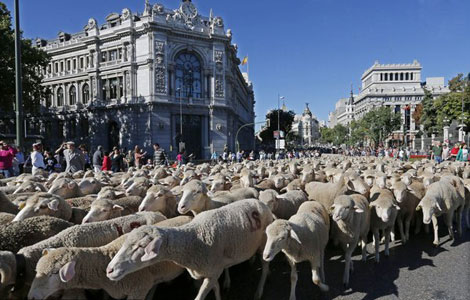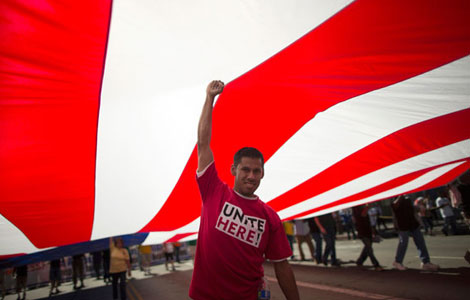

![US President Barack Obama speaks about the continuing government shutdown from the White House Briefing Room in Washington, October 8, 2012. [Photo/Agencies] Obama says he'll negotiate once 'threats' end](../../images/attachement/jpg/site1/20131009/eca86bd9ddb413bf077a5e.jpg) |
|
US President Barack Obama speaks about the continuing government shutdown from the White House Briefing Room in Washington, October 8, 2012. [Photo/Agencies] |
WASHINGTON - US President Barack Obama turned up the political pressure on Republicans on Tuesday, saying he would be willing to negotiate on budget issues only after they agree to re-open the federal government and raise the debt limit with no conditions.
At a news conference, an unbending Obama said he would not hold talks on ways to end the fiscal impasse under threat from "more extreme parts of the Republican Party."
"If reasonable Republicans want to talk about these things again, I'm ready to head up to the Hill and try," Obama told reporters.
"But I'm not gonna do it until the more extreme parts of the Republican Party stop forcing (House Speaker) John Boehner to issue threats about our economy. We can't make extortion routine as part of our democracy."
Obama's comments followed an earlier phone call to Boehner, who had adopted a slightly more conciliatory tone in comments to reporters after a meeting with House Republicans.
"There are no boundaries here. There's nothing on the table, there's nothing off the table," Boehner said, making no mention of his recent demands to delay parts of Obama's healthcare law in return for approving funds to end the government shutdown.
House Republicans emerged from their meeting saying they would insist on deficit-reduction talks with Obama as a condition for raising the federal debt limit, but some signaled they might pass short-term legislation to avert a default in exchange for immediate talks.
"If we have a negotiation and a framework set up, we can probably reach a way to raise the debt ceiling while the negotiation is in progress. But nobody is going to raise it before there is a negotiation," Republican Representative Tom Cole of Oklahoma said.
The bitter fiscal stalemate has shut down the federal government for eight days and threatens to prevent the raising of the country's $16.7 trillion borrowing limit before an October 17 deadline identified by Treasury Secretary Jack Lew.
The possibility the government could default on its debt sparked fears of potential global economic havoc, with foreign creditors and the International Monetary Fund's chief economist warning of the potential consequences.
"I think what could be said is if there was a problem lifting the debt ceiling, it could well be that what is now a recovery would turn into a recession or even worse," IMF chief economist Olivier Blanchard said.
Obama said he did not think the crisis would create lasting international damage. "As I said, if we deal with this the way we should, then, you know, folks around the world will attribute this to the usual messy process of American democracy but it doesn't do lasting damage."
Investors remain skeptical the parties are ready to resolve the standoff and are exhibiting increasing anxiety as the deadline for raising the debt ceiling approaches.
One of the stock market's most closely watched measures of investor nervousness, the Chicago Board Options Exchange Volatility Index, on Tuesday surged to its highest level since late June. The Standard & Poor's 500 index was down 1.2 percent in late afternoon trading.
In the US Treasury market, the sale of $30 billion of 1-month bills maturing November 7, not long after the government could run out of cash unless the debt ceiling is raised, met with weak demand that pushed bill interest rates to a five-year high.







